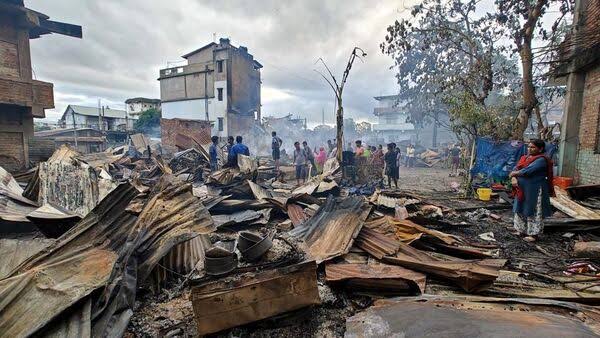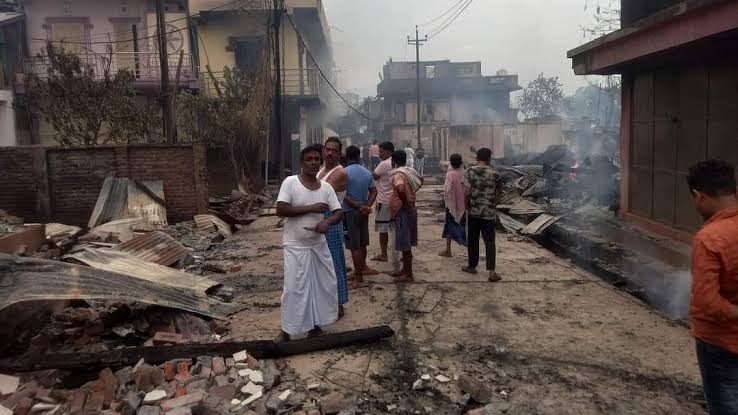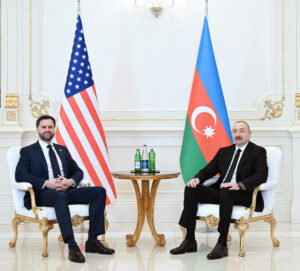Festering Manipur

Since early May, Manipur has been gripped by deadly ethnic violence, bringing the state to the verge of a civil war. Violent clashes between the Manipur’s largely Hindu Meitei and mostly Christian Kuki tribes have left more than 180 dead and thousands of homes and properties, including more than 250 churches destroyed. Well over 60,000 people have been displaced.
The most shocking incident was the parading naked of two Kuki women by Meitei men shortly after their village was razed. A few days ago, a mob of enraged women burnt the house of one of the five men accused of sexual assault on those two Kuki women, leading to a fresh spate of violence. Manipur has become another theatre of religious intolerance and ethnic violence in India.
Tensions flared up when Kukis began protesting against the state’s Bharatiya Janata Party (BJP) led government’s plan to extend tribal status to the Meiteis that would reinforce their strong influence on government and society, allowing them to buy land or settle in Kuki-dominated areas. Manipur has a population of estimated 3.3 million people. More than half are Meiteis who are largely Hindus, while around 43% are Kukis and Nagas, the minority tribes. Clashes between the Meitei and Kuki communities have led to the complete segregation of those groups. Kukis allege their ethnic cleansing by Hindu Meiteis and believe ‘separation is the only answer’.
The ruling BJP government in Imphal, the state capital, is widely seen by Kukis as biased against them. Shockingly, Prime Minister Narendra Modi remained silent for more than ten weeks while the mayhem in Manipur deepened. He broke his silence only after a humiliating video of two Kuki women brutally violated, went viral. The daily ‘The Telegraph’ commented that even when Mr. Modi condemned the violence, he spoke as a leader of the BJP, not as India’s Prime Minister. According to the Financial Times of 3rd August, the opposition parties regard the violence as a threat to national security as it could spill over to adjoining states in a volatile region and accused Mr. Modi of “brazen indifference” to the violence. It may be recalled that the states of North-East India known as the “Seven Sisters”, a region wedged between Bangladesh, China and Myanmar are plagued by several simmering secessionist movements.

Earlier on 13 July 2023, the European Parliament adopted a resolution by a large majority condemning the Indian government’s failure to bring peace to Manipur. It called upon India to “take urgent steps to restore calm” and “to tackle the impunity enjoyed by mobs perpetrating the violence..” In response, Mr. Modi’s government accused the European Parliament of a “colonial mindset”. In the face of international criticism, the BJP insists that vested interests globally are targeting Mr Modi. The Indian daily ‘The Telegraph’, in its editorial captioned ‘Global implications of the Manipur unrest’ dated 19th July 2023, wrote that members of the European Parliament even warned that New Delhi’s trade ties with Europe could be under the scanner. This accentuates the mounting concerns globally over India’s deepening religious and ethnic fissures and shrinking space for minority religious groups.
In its latest report, the United States Commission on International Religious Freedoms (USCIRF), has made scathing criticism of India on worsening religious freedoms in India. It states “Throughout the year, the Indian government at the national, state, and local levels promoted and enforced religiously discriminatory policies, including laws targeting religious conversion, interfaith relationships, the wearing of hijabs, and cow slaughter, which negatively impact Muslims, Christians, Sikhs, Dalits, and Adivasis (indigenous peoples and scheduled tribes)”. The USCIRF adds that since 2014, the BJP government has supported national and state-level policies that undermine religious freedom for minority groups.
India is playing a risky game in Indo-Pacific which may have consequences down the road. Long Xingchun, in his article entitled “India to invite trouble playing Taiwan card” published in Global Times, asserts that Taiwan secessionist forces and Indian separatists are in the same category.
If India makes the move to support Taiwan’s independence, China would have every reason to support separatist forces in North-East Indian states. This, however, is not the Chinese government’s view.
Last month, Suhasini Raj and Alex Travelli reporting for New York Times summed up the situation in Manipur well, “India, the world’s most populous country and home to the fastest-growing major economy, is now also the site of a war zone….And it presents an unwelcome image of instability for a national government focused on portraying India as a rising global power”. Undeniably, there is a huge schism between India’s image and reality. India, under the Hindu nationalist BJP government, is following authoritarian policies characterized by discrimination against religious minorities, especially Muslims and Christians, intolerance, intimidation, impunity, and censorship of media. India is fast drifting towards becoming a fundamentalist Hindu state.


